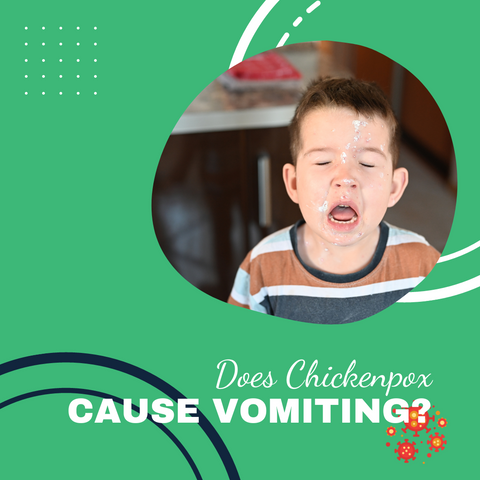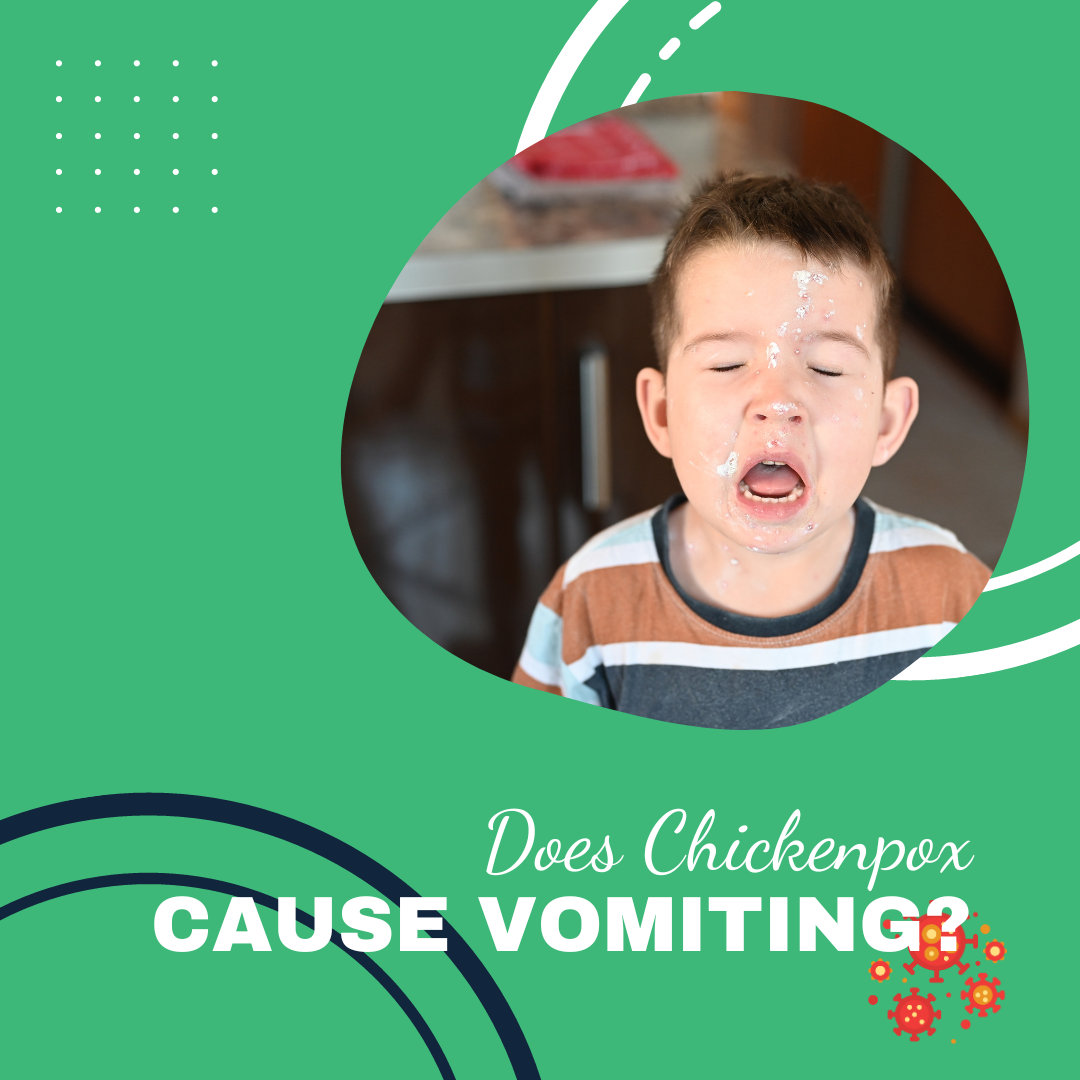Disclaimer: The information in this article is for informational purposes only and should not be considered a substitute for professional medical advice. Always consult a qualified healthcare provider for personalised guidance. We strive to provide accurate and up-to-date information, but we make no warranties or guarantees regarding the completeness, reliability, or suitability of the information. The use of this article is at your own risk. We are not liable for any damages or consequences resulting from the use of this information.
When it comes to chickenpox, the highly contagious infection caused by the varicella-zoster virus, we often associate it with the unmistakable itchy rash and fluid-filled blisters. However, there's a common question that needs clarification:
Does chickenpox cause vomiting?
In this article, we will delve into the facts surrounding this concern and provide you with a comprehensive understanding of the relationship between chickenpox and vomiting.
Symptoms of Chickenpox
Vomiting as a Symptom
While the most well-known symptom of chickenpox is the rash, it is accompanied by a variety of other symptoms, including fever, headache, and fatigue. If you are wondering whether chickenpox can cause a fever, it certainly can. 
Vomiting, although less common, can also occur during the course of the infection.
Vomiting may be a sign of a more severe case of chickenpox or a possible complication.
Why Does Chickenpox Cause Vomiting?
Immune System Response
Vomiting during chickenpox can be attributed to the body's immune system response to the virus.
As the immune system fights the infection, it releases chemicals called cytokines, which can cause inflammation and trigger nausea and vomiting.
Dehydration
Another reason for vomiting during chickenpox is dehydration. The fever and fluid loss from the blisters can cause a person to become dehydrated, which can lead to nausea and vomiting.
Dehydration can also worsen existing symptoms of chickenpox, such as fatigue and dizziness.
Managing Vomiting During Chickenpox
Fluid Intake
To manage vomiting during chickenpox, it's crucial to maintain adequate fluid intake to prevent dehydration.
Drinking water, oral rehydration solutions, and clear broth can help replace lost fluids and electrolytes.
Dietary Adjustments
Consuming small, frequent meals can help alleviate nausea and vomiting.
Opt for bland, easily digestible foods such as toast, crackers, and rice.
Avoiding spicy, greasy, or heavy foods can also help reduce the likelihood of vomiting.
Over-the-Counter Medication
Over-the-counter anti-nausea medications like dimenhydrinate may help manage vomiting in some cases. However, consult with a healthcare professional before using these medications, especially for children.
When to Seek Medical Attention
It's important to seek medical attention if vomiting is severe, persistent, or accompanied by other concerning symptoms such as high fever, difficulty breathing, or signs of dehydration like dizziness, dark urine, or extreme thirst.
It's essential to know when to seek medical attention for chickenpox.
Preventing Chicken Pox
Vaccination
One of the most effective ways to prevent chickenpox is through vaccination.
The varicella vaccine is typically administered in two doses, with the first dose given around 12-15 months of age and the second dose between 4-6 years of age.
For those who haven't been vaccinated during childhood, catch-up vaccinations can be given to adolescents and adults.
Hygiene and Quarantine
Practising good hygiene, such as frequent hand-washing and avoiding contact with infected individuals, can help prevent the spread of chickenpox.
If someone in your household has chickenpox, it is important to quarantine them as much as possible to minimise the risk of transmission to others.
If you are wondering whether you can go to work if your child has chickenpox, read more on our article.
Complications of Chickenpox
Chickenpox is a viral infection caused by the varicella-zoster virus.
While it is usually a mild disease, it can lead to complications in some cases (1).
Here are some of the possible complications of chickenpox:
- Bacterial infections: Bacterial infections of the skin, soft tissues, bones, joints, or bloodstream can occur in both children and adults (45).
- Pneumonia: Pneumonia is a lung infection that can occur in adults with chickenpox (45).
- Brain infection or inflammation: Chickenpox can cause encephalitis or cerebellar ataxia, which are brain infections or inflammations.
- Hemorrhagic conditions: Chickenpox can cause bleeding problems, such as hemorrhagic complications.
- Dehydration: Dehydration can occur when the body runs too low on water due to fever and loss of fluids from the skin blisters (1).
- Death: While deaths from chickenpox are rare due to the vaccine program, they can still occur in healthy, unvaccinated children and adults.
People who may be at high risk for complications include pregnant women, newborns, and people with weakened immune systems due to chemotherapy, immunosuppressive medications, long-term use of steroids, or transplants (4).
Adults with chickenpox are also more likely to be admitted to the hospital than children with the virus (4).
If you have a weakened immune system or are pregnant and not immune to chickenpox, it is important to talk to your doctor about the risks and necessary precautions (4).
Chickenpox in Adults and Children
Chickenpox tends to be more severe in adults than in children.
Adults are more likely to experience complications and may have a higher risk of developing pneumonia or other severe issues.
Therefore, it's essential for adults who haven't had chickenpox or been vaccinated to take preventive measures to reduce their risk of contracting the infection.
Long-term Effects of Chickenpox
In most cases, chickenpox has no long-term effects. However, the varicella-zoster virus remains dormant in the body and can reactivate later in life, causing shingles.
Shingles is a painful condition characterised by a rash and blisters, typically affecting older adults or those with weakened immune systems.
In Summary
While vomiting can be a symptom of chickenpox, it is not experienced by everyone with the infection.
Vomiting may be a result of the body's immune response or dehydration caused by the illness.
It's essential to manage vomiting effectively, maintain proper hydration, and seek medical attention if necessary.
Preventing chickenpox through vaccination and practising good hygiene can help reduce the risk of complications and promote overall health.
Frequently Asked Questions
Can chickenpox cause vomiting in adults as well as children?
Yes, vomiting can occur in both adults and children with chickenpox, although it is not a common symptom for everyone with the infection.
How can I prevent dehydration during chickenpox?
Ensure adequate fluid intake by drinking water, oral rehydration solutions, and clear broth. Avoiding caffeinated or sugary beverages can also help prevent dehydration.
Can I take over-the-counter medications for vomiting during chickenpox?
Over-the-counter anti-nausea medications like dimenhydrinate may help manage vomiting in some cases. However, consult with a healthcare professional before using these medications, especially for children.
Is the chickenpox vaccine effective in preventing the infection?
Yes, the varicella vaccine is effective in preventing chickenpox. It is typically administered in two doses, with the first dose given around 12-15 months of age and the second dose between 4-6 years of age.
Can chickenpox have any long-term effects?
In most cases, chickenpox has no long-term effects. However, the varicella-zoster virus remains dormant in the body and can reactivate later in life, causing shingles.





Share:
Choosing The Right Child Car Seat For A Child With Special Needs
How to Teach Your Child to Use Calming Music as a Coping Mechanism